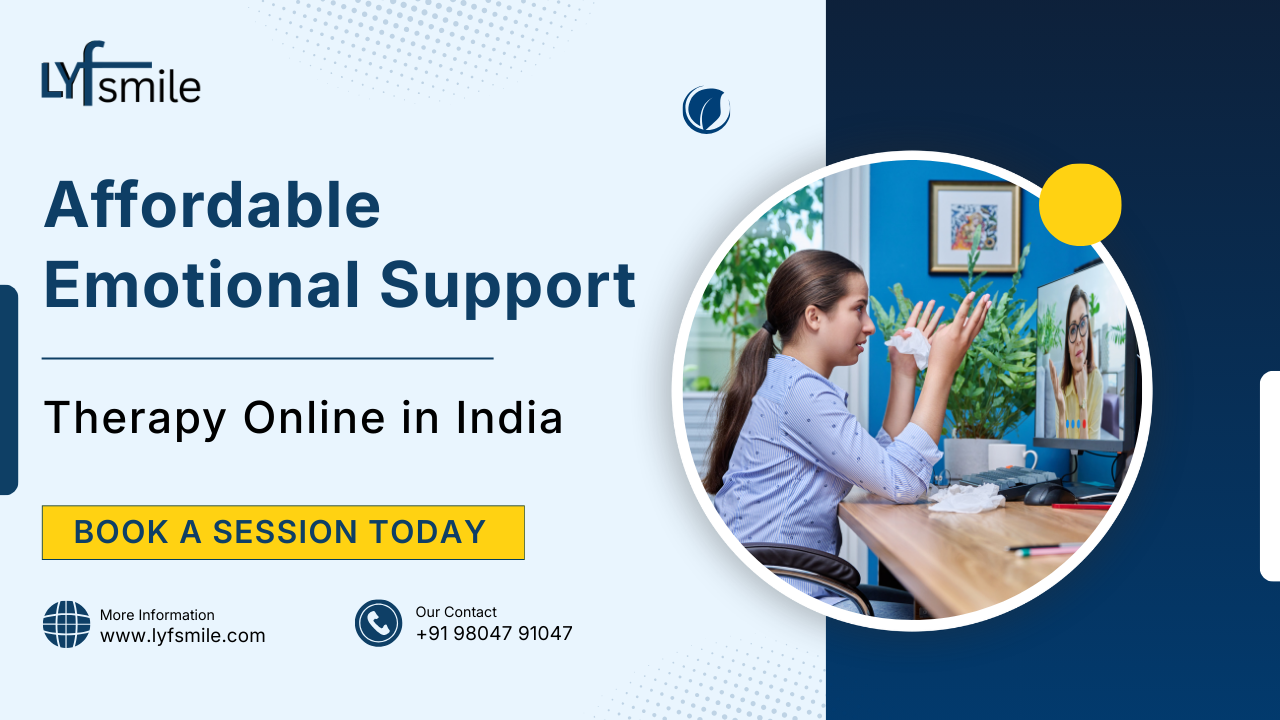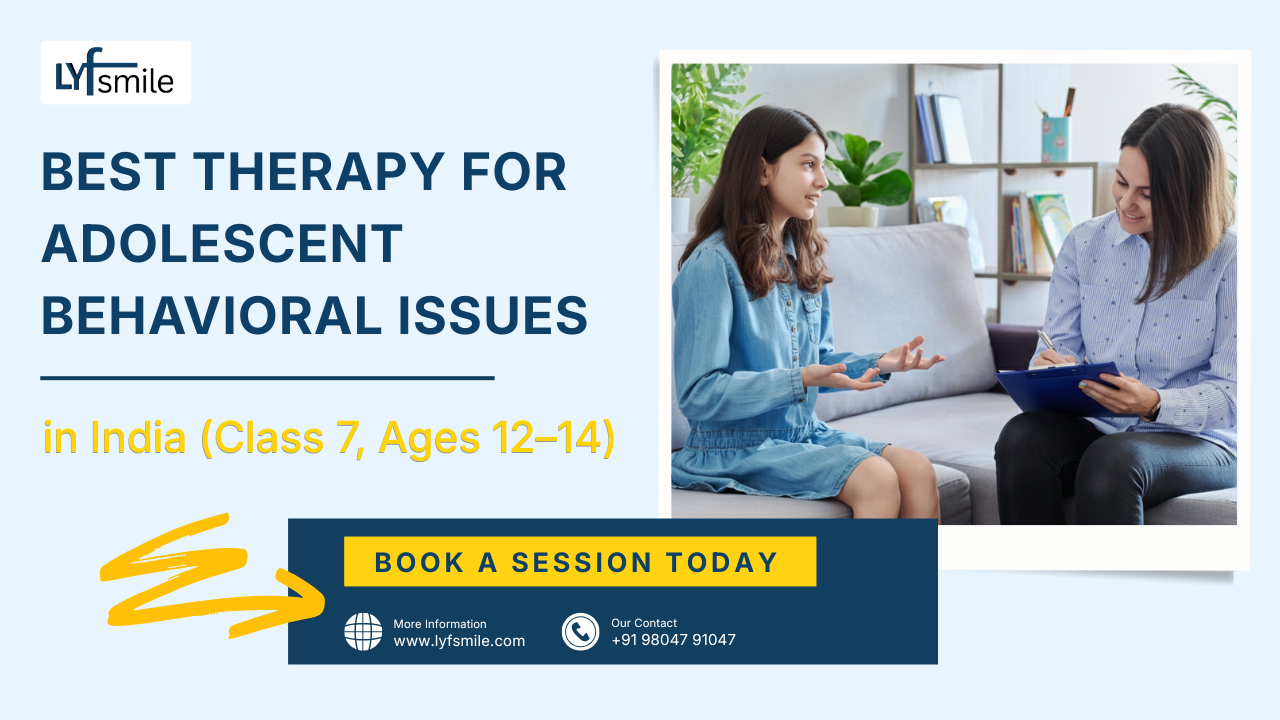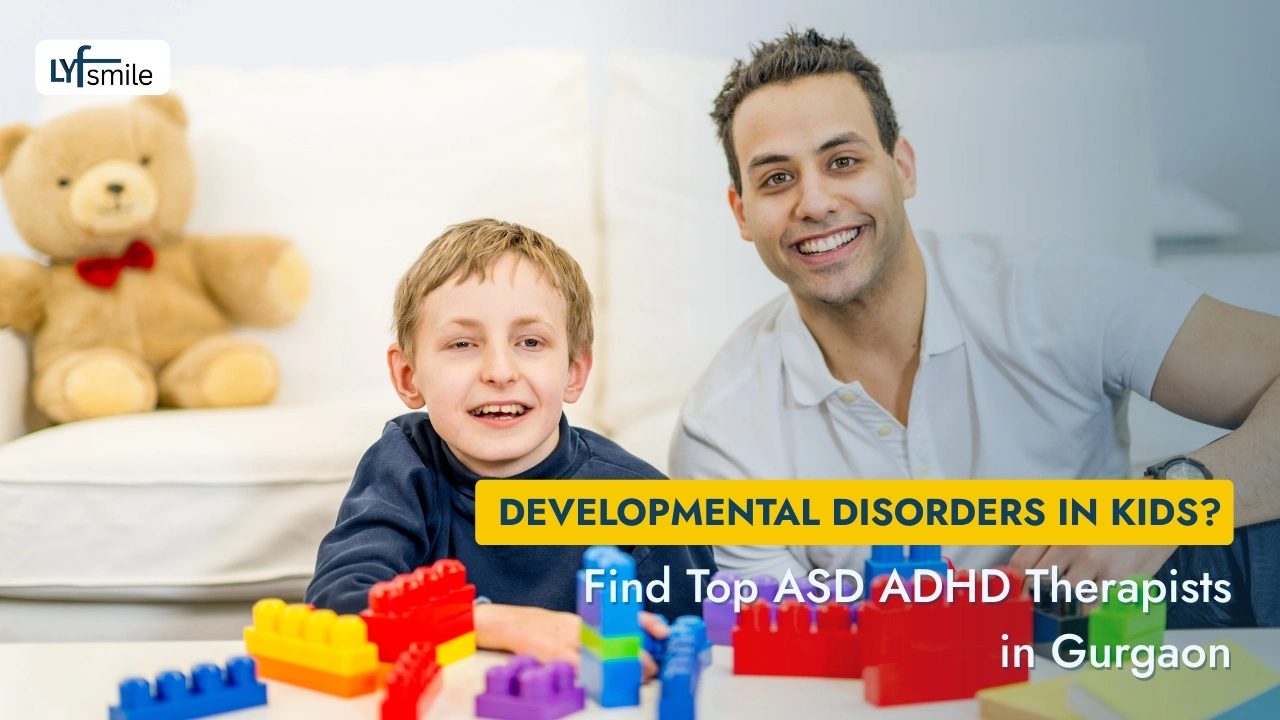
Lakshika Kaushik
Developmental Disorders in Children? Find Top Therapists in Gurgaon, India
Developmental disorders in children are conditions that affect a child’s cognitive, language, behavioral, emotional, and social development. These disorders usually begin in early childhood and can interfere with learning, communication, attention, and daily functioning.
This blog explains what developmental disorders in children are, their common types, early signs, causes, diagnosis, and available treatment options. It covers conditions such as Autism Spectrum Disorder (ASD), ADHD, speech and language delays, learning disabilities, and global developmental delay. The blog also highlights the importance of early assessment, therapy, and structured intervention, along with an overview of how Lyfsmile supports children through professional developmental evaluation and therapy services.
What Are Developmental Disorders in Children?
Developmental disorders in children are conditions that affect how a child grows, learns, communicates, behaves, and interacts with others. These disorders usually begin in early childhood and can impact one or more areas of development, such as speech, movement, learning ability, attention, emotional regulation, or social skills.
Children with developmental disorders may reach developmental milestones—like speaking, walking, understanding instructions, or social interaction—later than expected or in a different way compared to other children of the same age. These challenges are not caused by poor parenting or lack of discipline. Instead, they are related to differences in brain development that affect how a child processes information and responds to the world.
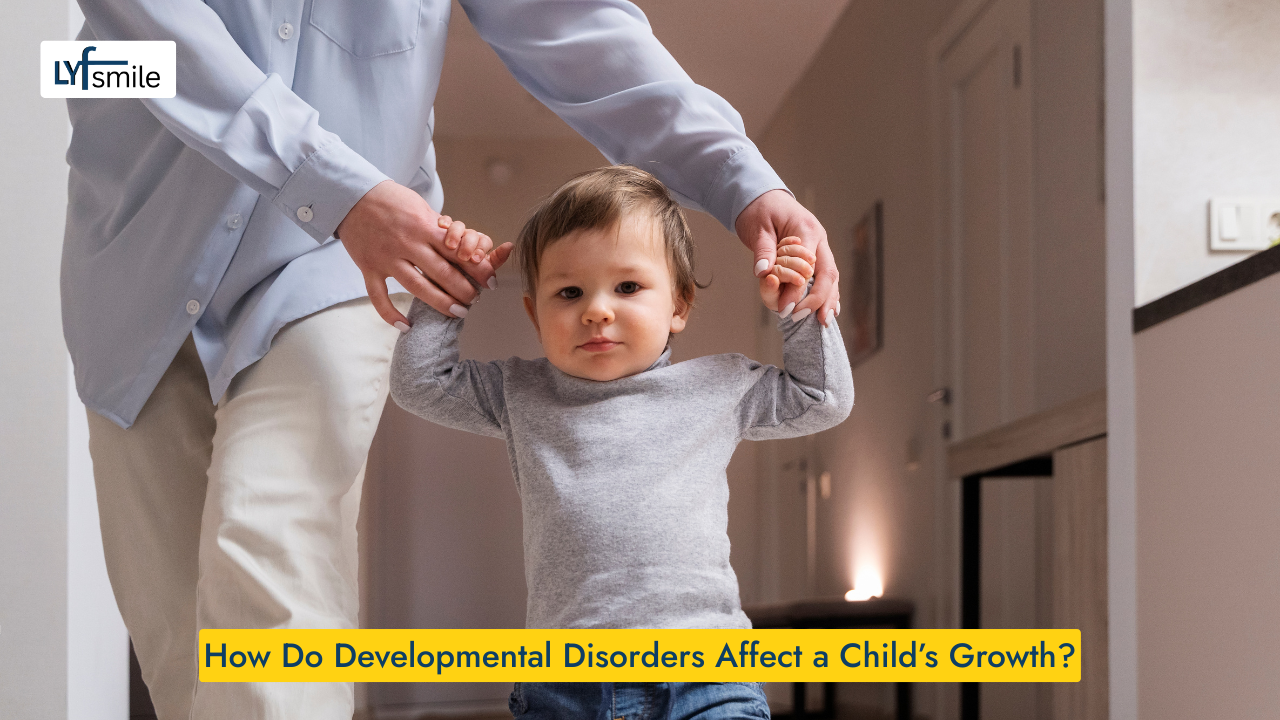 How Do Developmental Disorders Affect a Child’s Growth?
How Do Developmental Disorders Affect a Child’s Growth?
Developmental disorders affect a child’s growth by altering the natural pace and pattern of development. Instead of progressing evenly across all areas, a child may show delays in learning, communication, emotional regulation, or social skills because the brain processes information differently. Early signs of developmental disorders often include delayed speech, limited eye contact, difficulty following instructions, poor attention, and challenges in interacting with others.
Academic growth can slow when a child struggles with attention, understanding instructions, or retaining information, making learning require more time and support. Communication and emotional growth may also be affected, as limited speech or language difficulties reduce a child’s ability to express needs, often leading to frustration or behavioral challenges.
Social and daily functioning may become difficult when a child finds it hard to understand social cues, follow routines, or act independently. When these areas are affected together, overall development becomes unbalanced, highlighting the importance of early assessment and timely intervention.
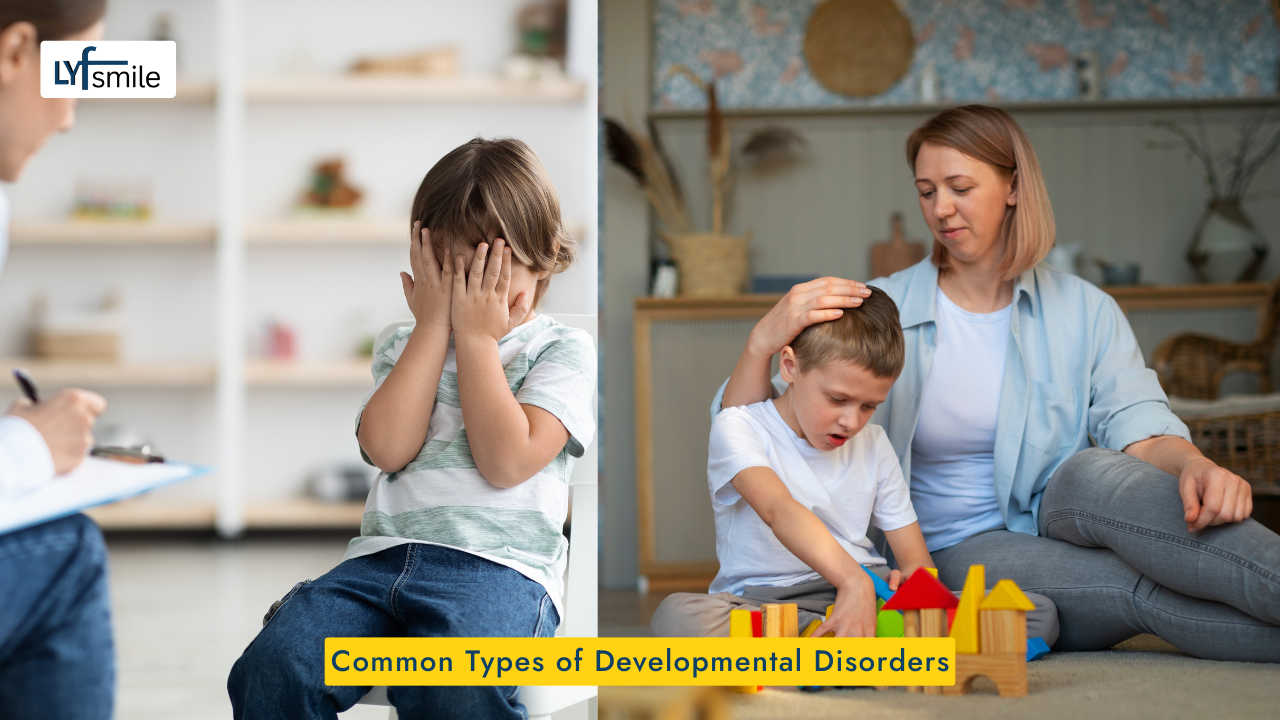 What Are the Common Types of Developmental Disorders in Children?
What Are the Common Types of Developmental Disorders in Children?
Developmental disorders in children refer to a group of conditions that affect how a child’s brain develops and functions over time. developmental disorders, meaning delays or difficulties in achieving age-appropriate developmental skills. These disorders typically appear in early childhood and can impact learning ability, communication, behavior, emotional regulation, and social interaction. Each developmental disorder affects a child differently, and the level of impact may vary from mild to significant.
Some children may experience challenges in only one area of development, while others may have difficulties across multiple areas. Understanding the common types of developmental disorders helps parents recognize patterns early and seek appropriate assessment and timely intervention.
Autism Spectrum Disorder (ASD)
Autism Spectrum Disorder is a neurodevelopmental condition that primarily affects social communication and behavior. Children with ASD may show limited eye contact, difficulty understanding social cues, delayed speech development, repetitive behaviors, or strong preferences for routines. The term “spectrum” reflects the wide range of abilities and challenges seen in children with autism, from mild social difficulties to significant communication and behavioral needs.
Attention-Deficit/Hyperactivity Disorder (ADHD)
ADHD affects a child’s ability to maintain attention, control impulses, and regulate activity levels. Children with ADHD may appear restless, easily distracted, impulsive, or unable to focus on tasks for long periods. These challenges can interfere with academic performance, behavior at home and school, and emotional self-control. ADHD in children does not reflect a lack of intelligence but rather differences in attention and executive functioning.
Speech and Language Disorders
Speech and language disorders involve difficulties with speaking, understanding language, or both. Some children may have delayed speech, unclear pronunciation, limited vocabulary, or difficulty forming sentences. Language comprehension issues may also affect a child’s ability to follow instructions or engage in meaningful communication. These disorders can impact learning, social interaction, and emotional expression if not addressed early.
Learning Disabilities
Learning disabilities affect how children process information related to reading, writing, mathematics, or reasoning. Children with learning disabilities may struggle academically despite having average or above-average intelligence. Common learning difficulties include problems with reading fluency, spelling, writing organization, or number concepts. These challenges can affect academic confidence and school performance without appropriate educational support.
Intellectual Disability
Intellectual disability is characterized by limitations in intellectual functioning and adaptive behavior. Children with this condition may have difficulties with problem-solving, reasoning, communication, and daily life skills. Intellectual disability varies in severity and often requires long-term educational, social, and functional support to help children achieve independence to the best of their abilities
Global Developmental Delay
Global developmental delay is diagnosed when a child shows significant delays in two or more developmental areas, such as speech, motor skills, learning, or social interaction. It is often identified in younger children and may later be reclassified as a specific developmental disorder as the child grows. Early intervention plays a critical role in improving outcomes for children with global developmental delay.
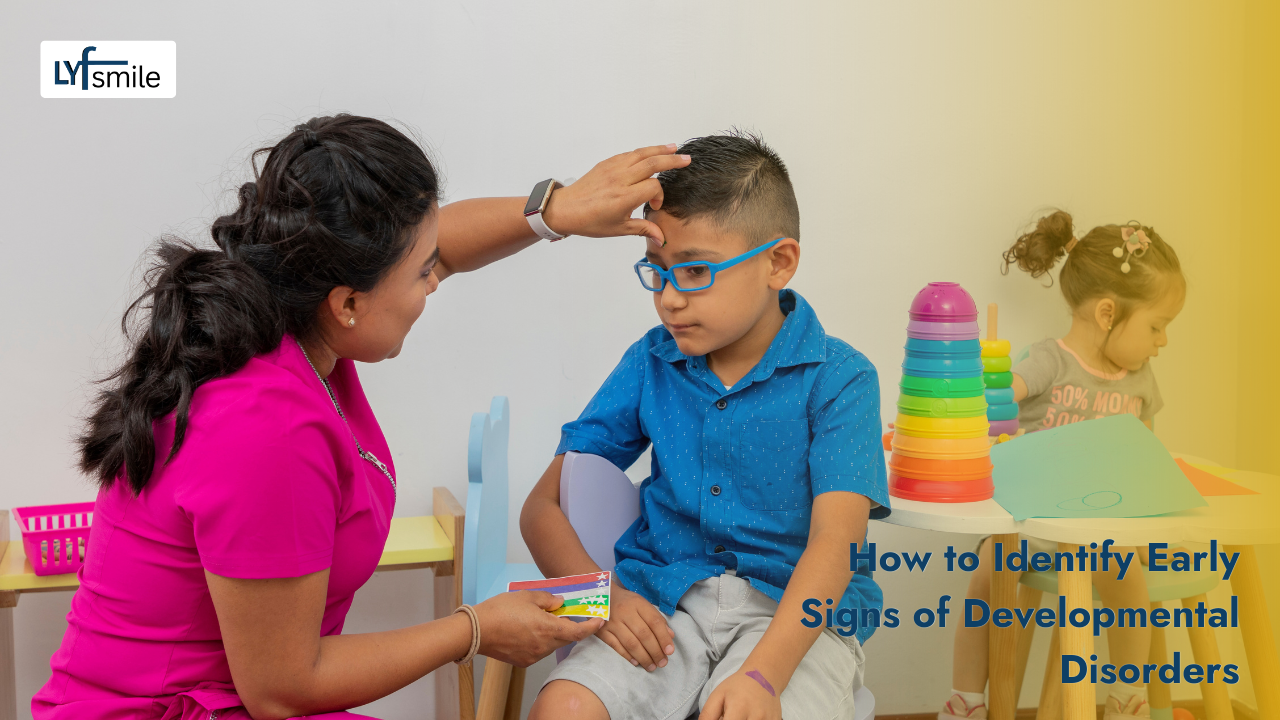 How to Identify Early Signs of Developmental Disorders in Children
How to Identify Early Signs of Developmental Disorders in Children
Developmental disorders are usually identified through consistent delays or differences in a child’s development across key areas such as communication, learning, behavior, social interaction, and daily functioning. These signs often emerge gradually during infancy and early childhood, when developmental milestones are expected to follow a predictable pattern. Early identification depends on observing persistent patterns over time, not isolated or temporary delays.
Concerns typically arise when a child’s developmental progress does not match age-appropriate expectations or differs noticeably from peers in everyday settings.
Early Signs in Infants and Toddlers (0–2 Years)
During the first two years, developmental concerns are often related to communication and social engagement. Early signs may include limited eye contact, reduced response to name, lack of babbling or gestures, and delayed speech development. A child may show minimal interest in social interaction, limited imitation, or difficulty expressing needs through sounds or gestures.
Early Signs in Preschool Children (3–5 Years)
In preschool years, developmental differences often become more noticeable. Children may struggle to form sentences, understand instructions, focus on tasks, or participate in age-appropriate play. Difficulty following routines, excessive restlessness, emotional outbursts, or challenges in interacting with peers may indicate concerns related to attention, behavior, or social development.
Key Developmental Areas to Observe
Developmental disorders usually affect more than one area of growth. Common areas where difficulties are observed include language and communication, attention and learning, emotional regulation, social interaction, and adaptive skills such as self-care and independence. When delays appear across multiple domains, the likelihood of an underlying developmental disorder increases.
Normal Development vs Developmental Red Flags
While some variation in development is normal, certain signs require closer attention. Red flags include lack of meaningful speech beyond expected age, persistent difficulty understanding simple instructions, limited social engagement, inability to regulate behavior appropriate to age, and delayed independence in daily activities. These concerns are more significant when they persist over time and across different environments, such as home and school.
Why Early Diagnosis of Developmental Disorders Is Important
Early diagnosis of developmental disorders is essential because it helps identify developmental challenges at a stage when the child’s brain is most responsive to intervention. Developmental disorders affect how children learn, communicate, regulate emotions, and interact socially, and these difficulties do not resolve on their own. Identifying concerns early allows professionals to distinguish between temporary developmental delays and underlying neurodevelopmental conditions that require structured support.
Timely diagnosis enables targeted intervention that reduces developmental gaps, supports learning readiness, and improves emotional and social functioning. Early support also helps parents understand their child’s needs clearly and plan appropriate therapy and educational strategies. Overall, early diagnosis leads to better long-term developmental outcomes and improved quality of life for the child.
How Developmental Disorders Are Identified and Diagnosed
Diagnosis of developmental disorders is based on a structured developmental evaluation rather than a single test. The process begins with observing the child’s behavior, communication, learning ability, emotional regulation, and social interaction across different environments such as home and school. Professionals compare the child’s developmental skills with age-appropriate milestones to identify areas of delay or difficulty.
A comprehensive assessment may include clinical interviews with parents, developmental screening tools, behavioral observations, standardized psychological or developmental tests, and feedback from teachers or caregivers. This detailed evaluation helps professionals determine whether the child’s challenges reflect a temporary developmental delay or a specific developmental disorder. Early and accurate diagnosis provides clarity and forms the foundation for appropriate intervention and therapy planning.
A Small Story Many Parents Feel Deeply
Riya was three years old, yet her world felt quieter than most children her age. While others laughed, spoke freely, and ran toward their parents, she sat on the floor, carefully lining up her toys, lost in her own space. Her parents smiled when people said, “She’s just taking her time,” but inside, a silent worry kept growing.
When Riya couldn’t express what she wanted, her frustration turned into tears. Each cry felt heavy, because her parents knew she was trying—she just didn’t know how to say it. Seeking professional guidance helped them understand that Riya wasn’t being difficult or delayed by choice; she simply needed support that matched the way she was developing.
With therapy, patience, and consistency, small moments began to change everything. A shared glance. A gentle response. Then, one day, a word. Those moments reminded her parents that asking for help didn’t mean something was wrong with their child—it meant they were helping her find her way.
How Does Therapy Help Children with Developmental Disorders?
Therapy plays an essential role in supporting children with developmental disorders by addressing developmental gaps in a structured and systematic manner. It focuses on improving functional skills, strengthening developmental abilities, and supporting overall growth across communication, learning, behavior, and social interaction. These challenges are often seen as child development problems, such as delayed speech, difficulty understanding instructions, poor attention, behavioral difficulties, limited social interaction, emotional regulation issues, and trouble adapting to daily routines.
How Therapy Supports Child Development
Improves Communication Skills
Therapy supports the development of speech, language comprehension, and non-verbal communication. Children learn to express needs clearly, understand instructions, and communicate effectively in everyday situations.Enhances Learning and Attention Abilities
Therapeutic interventions help improve focus, information processing, memory, and problem-solving skills, allowing children to engage more effectively in learning and academic environments.Supports Emotional Regulation and Behavior
Therapy helps children develop strategies to manage emotions, reduce impulsive responses, and cope with changes or challenges, supporting better emotional control and behavior regulation.Develops Social and Interaction Skills
Children learn appropriate social behaviors such as turn-taking, understanding social cues, peer interaction, and group participation, which are essential for social development.Builds Daily Living and Functional Skills
Therapy supports independence in daily routines, including self-care, task completion, and adapting to structured environments at home and school.Encourages Consistent Developmental Progress
Regular and structured therapy sessions provide reinforcement and practice, helping children develop skills gradually and consistently over time.Guides Parents and Caregivers
Therapy includes parental guidance to help caregivers understand the child’s needs and reinforce therapeutic strategies at home and in educational settings.
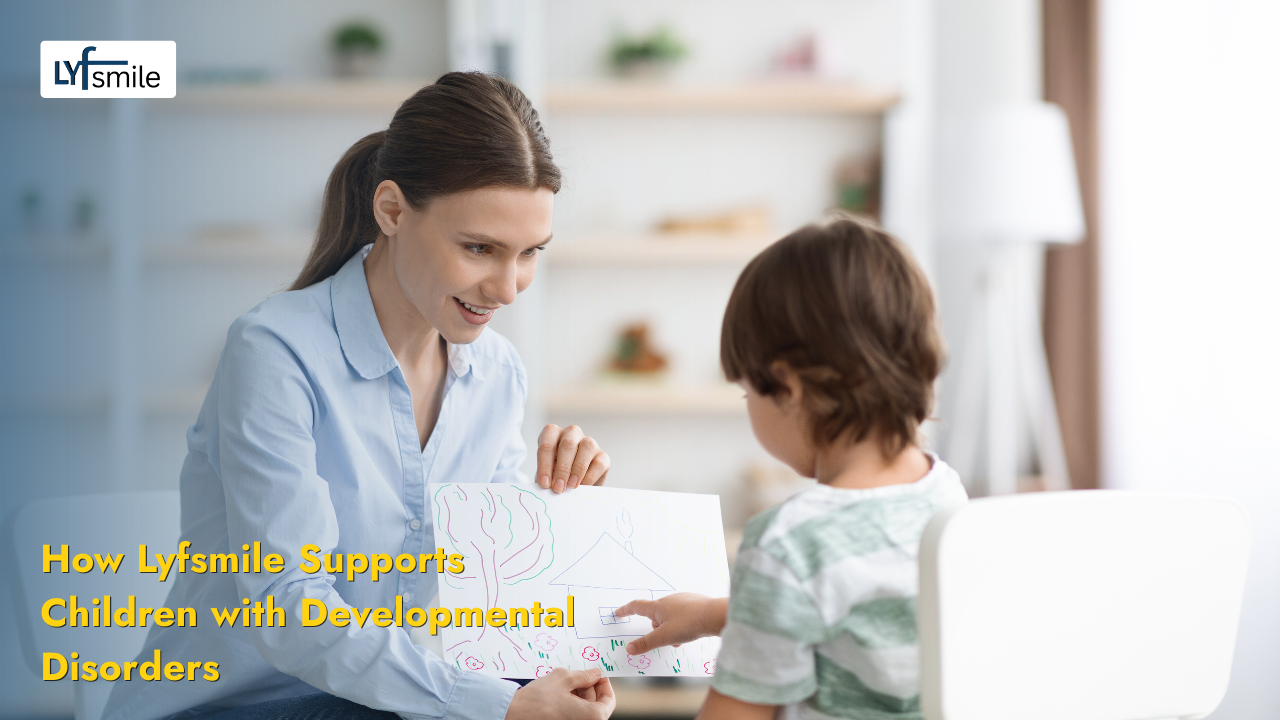 How Lyfsmile Supports Children with Developmental Disorders
How Lyfsmile Supports Children with Developmental Disorders
At Lyfsmile, the focus is on creating a supportive and understanding environment where children feel safe to grow at their own pace. The team works closely with families to guide development gently and consistently, helping children build confidence, independence, and everyday life skills over time.
Child-Centered Understanding
Lyfsmile follows a structured, child-centered approach that focuses on understanding each child’s unique developmental profile rather than applying generalized solutions.Comprehensive Developmental Assessment
A detailed assessment is conducted to identify the child’s strengths, challenges, and specific areas of delay across communication, learning, behavior, and social functioning, including delays in key developmental milestones such as speech, motor skills, emotional regulation, and independence.Personalized Therapy Planning
Based on assessment findings, a clear and individualized therapy plan is developed to address the child’s specific developmental needs instead of using one-size-fits-all methods.Integrated Therapy Services
Therapy programs may include behavioral therapy, speech and language therapy, occupational therapy, and emotional regulation support, depending on the child’s condition and areas of concern.Age-Appropriate & Supportive Intervention
Therapy is delivered in a safe, supportive, and age-appropriate environment, allowing children to build skills gradually and confidently, especially in areas where developmental milestones are delayed.Parent Guidance & Collaboration
Strong emphasis is placed on parent involvement, with practical guidance and strategies to support therapy goals at home and in school settings.Consistent Progress & Monitoring
Regular progress monitoring ensures therapy remains effective and helps reduce the long-term impact of developmental milestone delays.Holistic Developmental Support
By combining evidence-based therapy, continuous assessment, and family collaboration, Lyfsmile supports meaningful developmental progress and improved functional outcomes in everyday life.
When Should Parents Consult a Child Psychologist or Therapist?
Parents should consult a child psychologist or therapist when developmental, emotional, or behavioral concerns continue beyond what is expected for a child’s age. While occasional mood changes or mild delays are part of normal development, professional guidance becomes important when difficulties are consistent or start affecting learning, social interaction, or daily routines. Parent counseling for special needs children plays an important role at this stage by helping families understand their child’s needs and respond with the right support.
Consultation is recommended if a child shows ongoing delays in speech and language, difficulty following instructions, attention problems, frequent emotional outbursts, excessive hyperactivity, or social withdrawal. Parents should also seek support when teachers raise concerns about a child’s behavior or learning progress, as counseling helps parents align home and school strategies.
Early consultation is especially important when challenges are seen across multiple developmental areas, such as communication, behavior, social skills, and independence. Timely professional guidance, combined with parent counseling for special needs children, helps clarify concerns, reduce parental stress, and supports healthier developmental outcomes.
Conclusion
Developmental disorders in children affect how a child learns, communicates, behaves, and interacts with the world. These conditions develop gradually and may not always be immediately noticeable, which is why awareness, early identification, and timely intervention are essential.
With accurate assessment, structured therapy, and consistent parental involvement, many children with developmental disorders can make meaningful progress in functional skills and overall development. Early professional support plays a crucial role in helping children reach their potential.
If you have concerns about your child’s development, consult a qualified child psychologist or developmental therapist for an early evaluation. Timely assessment is the first step toward understanding and supporting your child’s developmental journey.
Frequently Asked Questions (FAQs)
What are developmental disorders in children?
Developmental disorders in children are conditions that affect a child’s overall development, including learning, speech, behavior, emotional regulation, and social interaction. These are classified as neurodevelopmental disorders in children and usually begin in early childhood. Conditions such as autism spectrum disorder, ADHD, learning disabilities, and speech delay are common examples of developmental disorders.
What are the early signs of developmental disorders in children?
Early signs of developmental disorders often appear as developmental delays in children across areas like speech, attention, behavior, or social interaction. Common signs include delayed speech and language development, difficulty focusing, limited eye contact, emotional outbursts, or lack of interest in social play. Recognizing these early signs of developmental disorders helps parents seek timely developmental assessment.
What is the difference between developmental delay and developmental disorder?
A developmental delay means a child is slower than expected in reaching certain milestones, such as talking or learning, but may catch up with appropriate support. A developmental disorder, however, is a long-term condition related to differences in brain development that affects learning, behavior, or communication and usually requires structured intervention and therapy.
Are developmental disorders permanent or can they improve with therapy?
Developmental disorders are long-term conditions, but with early intervention for developmental disorders, children can show significant improvement. Therapies such as behavioral therapy, speech therapy, and occupational therapy help improve communication, learning ability, emotional regulation, and daily functioning. Early and consistent developmental therapy plays a key role in improving long-term outcomes.


